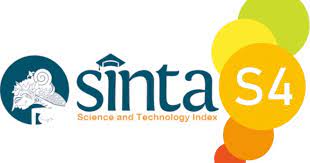The Highlighting Students’ Voices of Learning English Through Project-Based Learning During Covid-19 Pandemic: A Case Study
DOI:
https://doi.org/10.22219/englie.v4i2.27136Keywords:
COVID-19 Pandemic, Online Learning, Project-Based LearningAbstract
All the students need to adapt to the new version of the learning and teaching process. The use of project-based learning in the COVID-19 pandemic can help students who struggle to make an interaction with other students. This approach can help vocational high school students more easily understand the topic by using projects that relate to their workplace. This project aimed to explore the students’ voices using Project-based learning in English learning in the pandemic era. This case study used semi-structured interviews to interview five students from one of the vocational high schools in Jember that had already used the project-based learning method during a pandemic. This research results show that project-based learning was one method teachers might employ to help students learn English. The student’s English abilities and creativity could be enhanced while developing the project.
Downloads
References
Ali, W.(2020). Online and Remote Learning in Higher Education Institutes: A Necessity in light of COVID-19 Pandemic. Canadian Center of Science and Education, 10(3), 16-25. https://doi.org/10.5539/hes.v10n3p16
Almulla, M. A. (2020). The Effectiveness of the Project-Based Learning (PBL) Approach as a Way to Engage Students in Learning. SAGE Open, 1-15. DOI:10.1177/2158244020938702
Alsamani, A. S., & Daif-Allah, A. S.(2016). Introducing Project-based Instruction in the Saudi ESP Classroom: A Study in Qassim University. Canadian Center of Science and Education, 9(1), 51-64. http://dx.doi.org/10.5539/elt.v9n1p51
Ardhyantama, V., Apriyanti, C., & Erviana, L. (2020). Project-Based Learning as The Alternative for Distance Learning in Pandemic COVID-19. Indonesian Journal of Primary Education, 4(2), 141-151
Avneet, H., & Emma, A.(2021). Motivating Online Learning through Project-Based Learning During the 2020 COVID-19 Pandemic. IAFOR Journal of Education, 9(2), 93-110
Bakar, N. I. A., Noordin, N., & Razali, A. B.(2019). Improving Oral Communicative Competence in English Using Project-Based Learning Activities. Canadian Center of Science and Education, 12(4), 73-84. https://doi.org/10.5539/elt.v12n4p73
Bashan, B., & Holsblat, R. (2012). Co-teaching through modeling processes: Professional development of students and instructors in a teacher training program. Mentoring & Tutoring: Partnership in Learning, 20(2), 207–226.
Bell, S. (2010). Project-Based Learning for the 21st Century: Skills for the Future. The Clearing House: A Journal of Educational Strategies, Issues and Ideas, 83(2), 39–43. https://doi.org/10.1080/00098650903505415
Ben-Amram, M. & Davidovitch, N.(2021). The COVID-19 Period: A Crisis for on-Site Learning or an Opportunity for Optimal Distance Learning? Examination of Student Attitudes. Canadian Center of Science and Education, 10(3), 27-38. https://doi.org/10.5539/jel.v10n3p27
Braun, V.& Clarke, V. (2006). Using Thematic Analysis in Pshycology. Qualitative Research in Psychology, 3(2)
Clandinin, D. J., & Connelly, F. M. (2006). Narrative Inquiry: Experience and Story in Qualitative Research. p. 479
Duke, N. K., Halvorsen, A., Strachan, S. L., Kim, J., & Konstantopoulos, S. (2020). Putting PjBL to the Test: The Impact of Project-Based Learning on Second Graders’ Social Studies and Literacy Learning and Motivation in Low-SES School Settings. American Educational Research Journal, 20(10), 1-41. DOI: 10.3102/0002831220929638
Flick, U. (2009). An Introduction To Qualitative Research. Sage, pg. 191
Gardiner, W., & Robinson, K. S. (2009). Paired field placements: A means for collaboration. The New Educator, 5(1), 81–94.
Grossman, P., Dean, C. G. P., Kavanagh, S. S., & Herrmann, Z. (2019). Preparing teachers for project-based teaching. Phi Delta Kappan, 100(7), 43–48.
Guo, P., Saab, N., Post, L. S., & Admiral, W. (2020). A review of project-based learning in higher education: Student outcomes and measures. International Journal of Educational Research 102. https://doi.org/10.1016/j.ijer.2020.101586
Kartikawati, D. (2020). Application of Project Based Learning in English Teaching during a Pandemic at Al Azhaar Elemnetary School. Journal of English Language Teaching Learning and Literature, 3(2), 74–80.
Khoiriyah, K., & Setyaningrum, R. (2017). Project-Based Learning Method in Teaching English Speaking Skill for Eleventh Grade of SMA Negeri 3 Malang. A Journal Of Culture, EnglishLanguage Teaching, Literature & Linguistics., 2(3), 59. Https://Doi.Org/10.22219/Celticumm.Vol2.No3.59-71
Murphy, KL, & Gazi-Demirci, Y. (2001). Role Plays, Panel Discussions, and Case Studies: Project-Based Learning in a Web-Based Course.
Petersen, C., & Nassaji, H. (2016). Project-Based Learning through the Eyes of Teachers and Students in Adult ESL Classrooms. The Canadian Modern Language Review, 72(1), 13-39. https://doi.org/10.3138/cmlr.2096
Punyapat, C., Komkrit, C., & Elizabeth, M. 2020. Online Project-Based Learning and Formative Assessment. Tech Know Learn 25, 685–705. https://doi.org/10.1007/s10758-018-9363-2
Sirisrimangkorn, L. (2018). The Use of Project-based Learning Focusing on Drama to Promote Speaking Skills of EFL Learners. Advances in Language and Literary Studies, 9(6), 14-20. http://dx.doi.org/10.7575/aiac.alls.v.9n.6p.14
Smith, J. B., Lee, V. E., & Newmann, F. M. (2001). Improving Chicago’s schools: Instruction and achievement in Chicago elementary schools. https://consortium.uchicago.edu/publications/instruction-and-achievement-chicago-elementary-schools
Stoller, F.L. (2002). Project work: A means to promote language and content. In Richards, J.C., & Renandya, W.A. (Eds.). Methodology in language teaching: An anthology of current practic, pp.107-119). Cambridge: Cambridge University Press.
Thomas, J. W. (2000). A Review of Research on Project-Based Learning. Autodesk Foundation. http://www.bobpearlman.org.Best Practices/PBL_Research.pdf
Wahyuni, N. P. H. (2022). Project-Based Learning during Covid-19 Pandemic. Journal of Education Study, 2(1), 10-16. DOI: 10.36663/joes.v2i1.253
Wassell, B., & LaVan, S. K. (2009). Revisiting the dialogue on the transition from coteaching to inservice teaching: New frameworks, additional benefits and emergent issues. Cultural Studies of Science Education, 4(2), 477–484.
Widodo, H. P. (2014). Methodological considerations in interview data transcription. International Journal of Innovation in English Language Teaching and Research. 3(1), 101-109.
Xiaohong, W., Liu, S., & Xiao, L. (2016). Journal between Peer Learners: an Innovative Project to Motivate EFL Writers. RELC Journal, 47(2), 245-252. DOI: 10.1177/0033688215611595
Yiying, Z. (2015). Project-based Learning in Chinese College English Listening and Speaking Course: From Theory to Practice. Canadian Social
Downloads
Published
How to Cite
Issue
Section
License
Copyright (c) 2023 Vina Kautsar Rahmania, Bambang Suharjito, Rizki Febri Andika Hudori

This work is licensed under a Creative Commons Attribution-ShareAlike 4.0 International License.
Authors who publish with English Learning Innovation (englie) agree to the following terms:
- For all articles published in English Learning Innovation (englie), copyright is retained by the authors. Authors give permission to the publisher to announce the work with conditions. When the manuscript is accepted for publication, the authors agree to automatic transfer of the publishing right to the publisher.
- Authors retain copyright and grant the journal right of first publication with the work simultaneously licensed under a Creative Commons Attribution-ShareAlike 4.0 International License that allows others to share the work with an acknowledgement of the work's authorship and initial publication in this journal.
- Authors are able to enter into separate, additional contractual arrangements for the non-exclusive distribution of the journal's published version of the work (e.g., post it to an institutional repository or publish it in a book), with an acknowledgment of its initial publication in this journal.
- Authors are permitted and encouraged to post their work online (e.g., in institutional repositories or on their website) prior to and during the submission process, as it can lead to productive exchanges, as well as earlier and greater citation of published work (See The Effect of Open Access).
This work is licensed under a Creative Commons Attribution-ShareAlike 4.0 International License.
















1.png)












